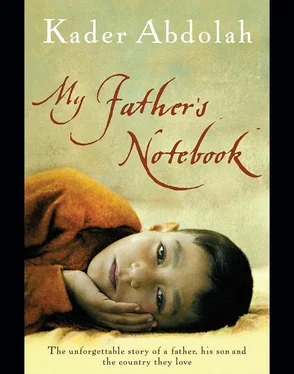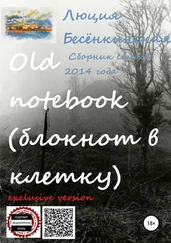The focus of the conversation had suddenly shifted. My contact person didn’t comment further, but told me I’d be notified of the party’s decision.
A week later I was unexpectedly summoned to a confidential meeting with Homayun, one of the legendary leaders of the resistance. We talked for a long time about my father, his contacts in the border area and his knowledge of the mountain trails. I was then given permission to meet my father in secret a few times a year. It was also my job to prepare him “in case the party needed him”. What that meant, neither of us knew. In any event, the party leadership realised that it had a trustworthy deaf-mute in its service, who was prepared to do anything for his son.
At last I was allowed to secretly visit my father, whom I hadn’t seen for a long time.
He was doing well, mostly because of his shop. Setting him up in a small business had been an excellent decision. Golden Bell had bought a good secondhand stove and had it moved to the shop. All year long, my father went around collecting twigs and branches for the winter like some doddery old bird. It made Tina furious. Whenever I called, she moaned, “Son, I’m ashamed of your father. He does one stupid thing after another. No matter where I go, I see him with a bundle of twigs on his back. He even climbs trees to snap off the dead branches. When I run into him in town, I have to hide my head in shame.”
I laughed at the thought of him climbing a tree to snap off a branch.
“You can afford to laugh,” Tina said angrily. “You’re not here, you don’t have to see him. I’m the one who’s melting from shame like a candle. You’re gone and it doesn’t affect you in the slightest. I’m a mother, I’ve got three daughters at home and I have to—”
“There’s no need to make such a fuss, Tina. You know how he is. We can’t change him.”
“Why not? You just don’t want to. It’s all your fault, you’re the one who abandoned him. He listens to you, but you haven’t said a word. Why don’t you come and visit us, son? People need to see that my daughters have a learned brother and not just a stupid father. Listen to me! Come home! Your sisters’ futures depend on it!”
Tina was right about one thing. My father did seem to be slipping. He was doing stupid things more often now. Well, not really stupid, but I don’t know what else to call them. How could I get him to stop climbing trees? I couldn’t be around to scold him all the time.
We had to face facts and accept him the way he was. Tina was unable to do that.
Despite his initial hesitation, my father was very proud of his shop. Wherever he went, he took the key out of his pocket and showed it to everyone, “Look, the key to my shop. Ishmael gave it to me. He’s a student in the city of the shah. He’s learning about airplanes. If someone pinches your nose and puts his hand over your mouth, you’ll die, because air is very important.”
The shop had been his salvation. He no longer had to roam the streets in search of customers. Nor did he have to hang around the house during the winter when he was out of work. He simply went and sat in his shop. That’s why he gathered twigs and branches: they made him feel peaceful and secure.
He stayed in his shop till late at night. Who knows, a customer might drop by, or maybe Ishmael would turn up out of the blue one day.
On my way to the shop, I bought him a bag of firewood. The snow crunched beneath my feet. All was quiet in my old area — the lights in the windows had long been extinguished, the curtains drawn. Everything was in deep sleep, everything except my father’s chimney. It was still smoking.
There was a soft yellow light in his window. I peeked inside. He was sitting on his carpet, next to the stove. His head was bent over a book, which was open on the low table in front of him.
My God! I thought. What’s he reading?
He looked like a scholar. No, like an imam reading a book in a mosque. No, not that, either, more like a craftsman, a carpet-weaver, who was going to repair the book rather than read it. A couple of his customers’ Persian rugs were rolled up on the table beside the book and on the wall was a large framed photograph of the shah in a military uniform.
I was startled. Why was the dictator’s picture hanging in his shop? At first I was angry, but then it occurred to me that perhaps it was better this way.
I gently pushed open the door. It squeaked. I should oil those hinges, I thought. I slipped inside. My shadow fell over the book. He raised his head and looked at me, without a flicker of recognition. I took off my hat. A shy smile appeared on his face.
“I didn’t recognise you with a moustache,” he signed and stood up.
I thought he was going to hug me, but he didn’t. He kept staring — at my hat, my glasses, my moustache. I held out my hand. “Why don’t you shake my hand? Here, I’ve brought you some firewood.”
He pointed, looking slightly embarrassed, at his pile of twigs and branches, then hesitantly shook my hand. He hung the bag of firewood respectfully on a hook and probably never touched it again.
“Why are you staring at me like that?” I signed. “Aren’t you going to offer me a cup of tea?”
“Oh, yes, sit down,” he pointed at the carpet, then corrected himself. “No, not there, wait a minute.” He pulled out a chair and offered it to me. “Please be seated.”
He thought I’d become a gentleman, a gentleman in a hat. I put the chair back and sat on the floor next to the stove. He poured me a cup of tea and stood hovering over me like a waiter. “Why don’t you come and sit by me?”
He did sit, but at a respectful distance and with his hands on his knees. It was what he wanted, so I stopped protesting.
“How’re you doing?” I signed. “Are you pleased with your shop?”
“Yes, thank you, I’m pleased,” he replied and bowed his head.
“And how’s Tina?”
“She’s fine, thank you.”
I pointed at the photograph. “I see you have a picture of the shah in your shop,” I said.
His eyes lit up. He started to say something, to offer an explanation, but changed his mind and kept sitting there politely on his knees. After a brief silence, he hesitantly signed, “How are you? Is everything all right?”
“Yes, I’m fine,” I replied.
“Where have you been?” he continued. “Why don’t you come home any more? Why don’t you phone? Golden Bell is waiting for you to call. She’s grown up. She asked me to tell you that she wants to see you. I know you don’t have much time, that you have a lot of books to read, and I understand. But maybe you could give us a call every once in a while.”
“OK, I will, but it’s become a lot harder.”
“What has? The books?”
“No, not the books. Well, yes, the books are hard, too. But take that picture on the wall, for example. Do you know who that man is?”
“He’s the son of Reza Khan,” he gestured proudly. “You know that. He’s an important man with a gold crown on his head. He owns lots of horses and rifles and carries a pistol with him at all times. He’s a very important man. All the carpet-weavers in the city have his portrait in their shops. Me, too, I bought a picture. No, wait, I didn’t buy it, a city official brought it here and I had it framed. It’s nice, isn’t it?”
I didn’t answer. He started to say something else about the picture, then suddenly sensed that I didn’t share his enthusiasm. So, instead he said, “Do you think it’s wrong?”
“Yes, no … I mean I’m talking about something else.”
“But all the carpet-weavers like him,” he hesitantly signed. “His picture is in all the shops. He’s a good man.”
“I don’t agree,” I signed.
Читать дальше












